
What to include in a CV - an international guide

Writing a CV or resume can be confusing, especially if you are applying for jobs in a foreign country. Exactly what you should include in a CV varies greatly depending on your location. This guide will walk you through what to include, no matter where in the world you are applying.
Browse our gallery of resume examples here.
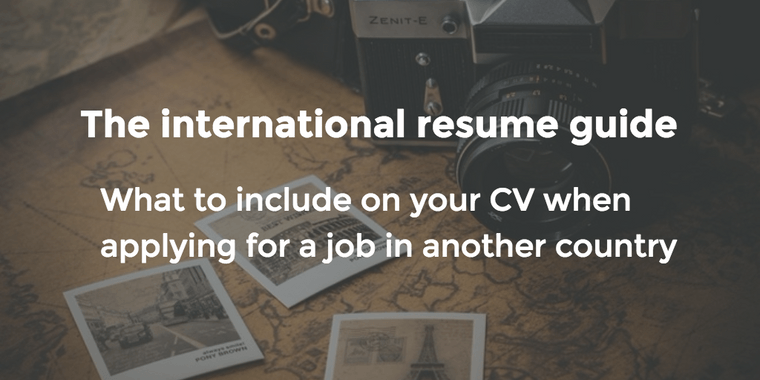
North America, Australia and the United Kingdom
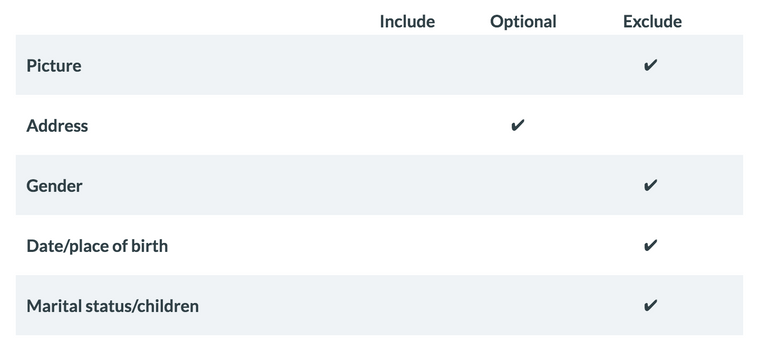
For job applications throughout the Anglosphere, a one to two page resume is expected. It should include examples of your work experience, skills, and education, with specifics and details tailored to the position you are applying for.
Resumes can be chronological or functional. A chronological resume has your work history arranged by date, beginning with the most recent. Functional resumes focus on skills, with work experience organized by expertise.
Browse our gallery of resume templates here.
Chronological resumes are the most common. They do a good job of depicting the progression of your career and showing how your skills have developed. Functional resumes tend to be used by people who are making a significant career change, so their most recent position may not be the most relevant, or have long gaps in their work history.
Your resume should include sections covering work experience, education, and skills. Certifications, publications, and volunteer work are all appropriate to include if possible. A brief summary of yourself can also be an asset, but is optional.
Do not include a picture with your resume for traditional job applications. In the interest of privacy and non-discrimination, many employers do not want to know what you look like before interviewing you and will remove any resumes with pictures from consideration. Due to the increasing prevalence of social media and online portfolios, this norm is changing, but for now it is better to err on the side of caution and omit your picture.
For profiles or resumes that are available on the internet, however, a picture is recommended. A tasteful, professional photo can go a long way in selling yourself online.
Age or date of birth, gender, nationality, and marital status should all be left off of your resume for similar reasons of non-discrimination.
It is not necessary to include your full address in your resume - your city and state is sufficient. You also do not need to include all of your references, though you may want to mention that they are available upon request. If an employer is impressed with your initial application and wants to speak to your references, they will ask for them.
Only include your high school education if you are a recent graduate or have no postsecondary experience. If you do choose to display your high school, only include the school name and the dates you attended. No more detail is necessary (in the UK, it is appropriate to include A and O levels).
Related: UK CV Format, Examples and Requirements
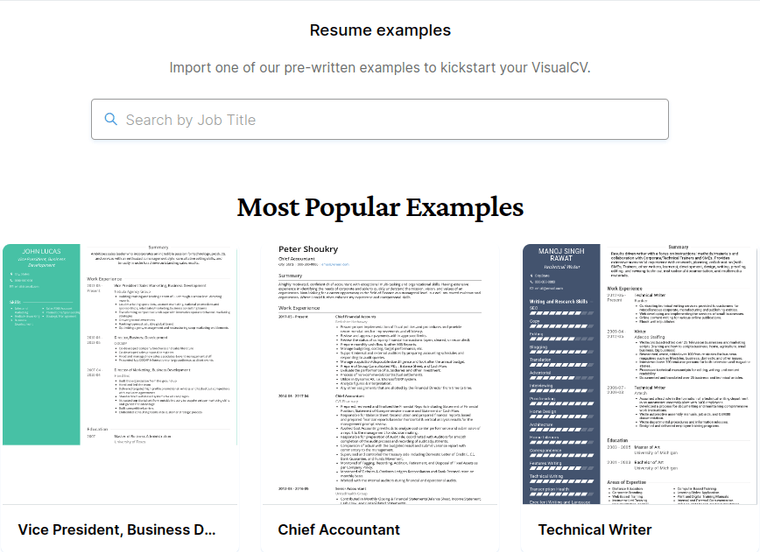
Europe
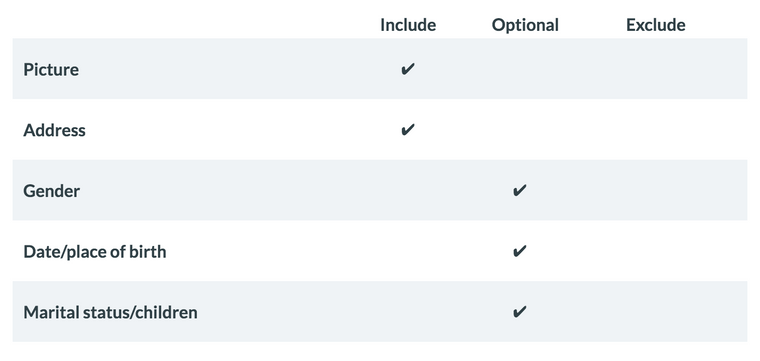
European resumes are typically referred to as CVs, but are formatted like a North American resume (as opposed to a North American CV, which is usually longer and more detailed). This means that the choice between a functional or chronological resume remains, as does the recommended length of one to two pages.
However, more personal information is expected in European resumes.
A picture, for example, is expected. A professional headshot is appropriate to include on your resume or with your application.
It is also common to include information like age and marital status - things that would be inappropriate in North America. You can also include the number of children you have, as well as their ages, though this is optional.
It is also common to include your gender and nationality, though this is not required.
As much of Europe is multilingual, it is important to include your language skills. Specify your level of fluency with each language and whether your skills are written or spoken.
Finally, it is common but not required that you include a personal interests section. Don't just list generic hobbies, however - only include activities that help to sell your skills or make you seem particularly interesting.
Of course, Europe is a diverse place. Each country has its own set of expectations of what to should be included in your CV. Some highlights from certain countries will be provided below, but be sure to research your country before sending out applications.
Germany
German employers will expect more detail in your CV. German CVs tend to be longer, running two to three pages, and should include references. It is also expected that you include your date of birth and place of birth, your nationality, and your full address. You can include your marital status and children, but this is optional.
France
In France, your CV needs a picture, your age, your address, your marital status and number of children. It is also customary to include a handwritten cover letter in applications, though this is becoming less common as online applications become the norm.
Spain
For Spanish CVs, a photo is recommended. You should also include your nationality, place of birth and date of birth, full address, and passport number.
Russia
A Russian CV is no more than two pages. It includes a full address, place and date of birth, and marital status. A picture is optional, but not recommended.
The Middle East and Africa
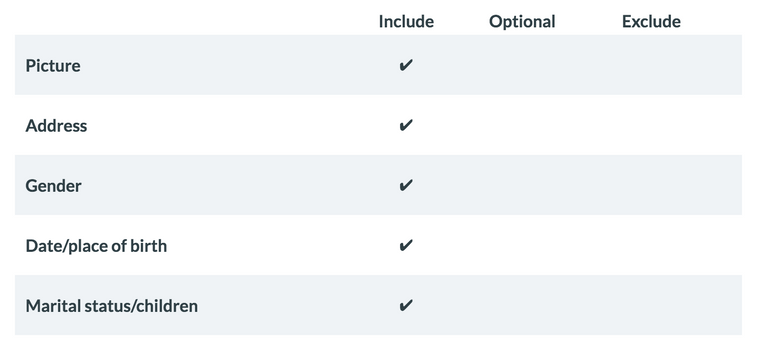
Resumes for applications in the Middle East can be up to three pages, but two pages is recommended. It is common to include a brief description of your current employer, but this is not necessary for past positions.
Split entries in your work history into two sections: Responsibilities and Achievements. Employers will appreciate the clear organization and readability. This is also a great way to differentiate between what the role required and what you brought to it.
Employers in the Middle East expect a lot of personal information in your resume. A picture is required, as is your age and gender. You will also want to state your marital status and your nationality.
Include your full address in your contact information. If you are willing to relocate, you should mention where you are willing to move to and where you are currently residing.
Be sure to include your language skills. Specify your level of fluency with each language and whether your skills are written or spoken.
It is not necessary to include references directly on the CV. Simply mention that they are available.
Asia
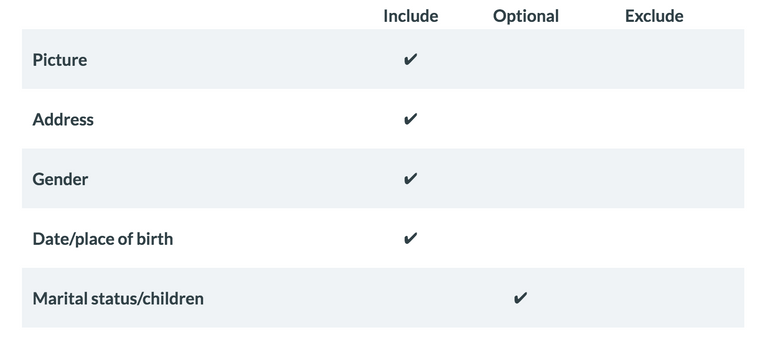
Resumes in Asia will have different expectations from country to country. Generally, however, it is expected that you include a picture, your gender, and your place and date of birth.
China
Chinese employers expect that a picture is included in your resume. Also include your gender and the date and place of your birth. It is acceptable to include the reason you are leaving your previous employer, but this is not required.
Japan
Resumes in Japan, called rirekisho, are unique in that they follow a very specific format. Templates for rirekisho can be found online or purchased from most Japanese convenience stores and must be filled in by hand. Individual rirekisho must be made for each application, and it is important to write very neatly. The template includes space for a picture, date of birth, gender, and address.
India
Indian resumes typically include a picture. In India it is also customary to include a Personal Details section at the end of a resume that includes date of birth, marital status, nationality, languages, and passport number.
South America
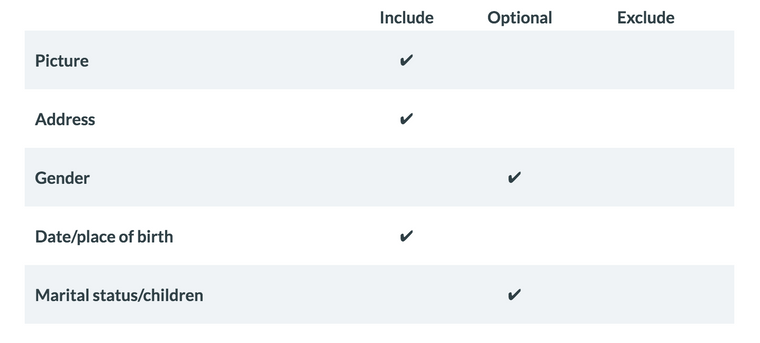
South American resumes should include a picture. Your personal information section must contain your full address and birthdate.
It is recommended that you include your gender, nationality and your language skills (spoken or written). In some South American countries, such as Brazil, it is appropriate to include marital status and even religion, but these are also optional.
What sections should be included in a CV?
In any CV, the following sections should be included:
- A CV header section with contact information and links to your portfolio.
- A CV summary or career objective section.
- A work history section that includes all relevant industry experience.
- An education section that clearly displays your academic credentials.
- A CV skills section that highlights your skills, certifications and accomplishments.
What should be included in a good CV?
Any good CV should have a heading, summary, work history, skills and achievements listed in it. Apart from those sections, quantified achievements complimented by skills generally make a good CV.
Conclusion
Expectations of resumes are change from country to country. The specific culture of each location affects what is appropriate to include in a job application. It is important to know what employers expect to ensure that your resume doesn't stand out for the wrong reasons.

Written By
James Clift
Co-Founder & Director
James is an entrepreneur and the Co-Founder of VisualCV. He has spent the last 10 years building businesses, from window cleaning to software. His passion is helping individuals create the careers they want.

CV Photo Advice and Tips: Should your CV have a photo?
June 26, 2020
Read Post

Co-Founder & Director
![The 2024 Resume Writing Guide [+ Job Search Tips and Resume Examples]](/static/0a451b7c20b67c3a0ce6a7b4a7680f5f/61ca5/Resume_Guide.jpg)
The 2024 Resume Writing Guide is filled with quality job search tips, resume examples and information you need to know before writing your resume or CV.
October 11, 2024
Read Post

VP Marketing & Resume Expert

The top hiring and human resource statistics for 2024, including data on AI resumes, job interviews, remote work, and recruiting.
September 7, 2024
Read Post

Community Success Manager & CV Writing Expert
Copyright ©2024 Workstory Inc.